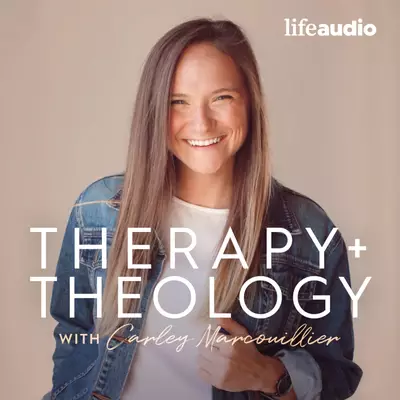Listen on Your Favorite App
4 Reasons Why You Have a Hard Time Saying “No”
October 13, 2021
00:00
33:46
Listen on Your Favorite App
From boundaries, communication, differentiation, loneliness and community etc. There are many important truths and techniques to support us in developing healthy and God honoring relationships with those around us. I am finding that to love those around me well, I must start with uncovering messages I have believed, addressing patterns of unhealth, and reframing my perspective through practice and prayer.
So, today’s episode is going to focus on one of the most common questions brought into therapy. Why is it so hard to say “no”?
I am learning, slowly, that whether professionally or personally, I must find my edges. Learn my limits, and communicate my choices clearly.
AKA we need to know and name our boundaries. These spoken or unspoken relational lines are meant to help us distinguish where we end and others begin.
One of the easiest ways to test the quality of your boundaries is to ask yourself two simple questions:
Do I say no?
Do I apologize for my limits?
If you answered yes to either then you are in good company.
So, the question is WHY?
What motivates us to contradict our capacity, push ourselves beyond our limits or dismiss our needs, feelings, and values?
The top 4 reasons you have a hard time saying no:
1. Guilt of letting people down – this is the most common reason
2. Need to “help” others in over to be loved – “Am I doing this -for- love, or -from- love?”
3. Needing to please people
4. Need of acceptance
What Are the Consequences of Not saying No?
These symptoms may be present if you don’t implement boundaries:
1.Enmeshment /Codependency
2.Emotional distress
3.Resentment
4.Guilt/fear cycle
Let’s reframe our perspective. Here’s what boundaries are NOT…
1. walls
2. others’ responsibility
3. equal
4. selfish
What boundaries ARE …
1. Relational Tracks
2. property lines of one’s personal power
3. individualized
4. self-care
Boundaries 3 key components:
1.Ownership - personal power
2.Choice - yes and no
3.Responsibility - invitation vs. expectation
Practices:
1.Check in and invite God in too
2.Explore your values by going back to God’s word
3.Name your limits
4.Take small bites - build with small no’s
Show Resources:
https://www.boundaries.me
https://www.emotionallyhealthy.org
Follow Carley:
Website | Instagram | Facebook
To access more content and join my monthly email list for the latest episodes and info, visit my website at carleymarcouillier.com
Episode Image Credit: Getty/Elenabs
So, today’s episode is going to focus on one of the most common questions brought into therapy. Why is it so hard to say “no”?
I am learning, slowly, that whether professionally or personally, I must find my edges. Learn my limits, and communicate my choices clearly.
AKA we need to know and name our boundaries. These spoken or unspoken relational lines are meant to help us distinguish where we end and others begin.
One of the easiest ways to test the quality of your boundaries is to ask yourself two simple questions:
Do I say no?
Do I apologize for my limits?
If you answered yes to either then you are in good company.
So, the question is WHY?
What motivates us to contradict our capacity, push ourselves beyond our limits or dismiss our needs, feelings, and values?
The top 4 reasons you have a hard time saying no:
1. Guilt of letting people down – this is the most common reason
2. Need to “help” others in over to be loved – “Am I doing this -for- love, or -from- love?”
3. Needing to please people
4. Need of acceptance
What Are the Consequences of Not saying No?
These symptoms may be present if you don’t implement boundaries:
1.Enmeshment /Codependency
2.Emotional distress
3.Resentment
4.Guilt/fear cycle
Let’s reframe our perspective. Here’s what boundaries are NOT…
1. walls
2. others’ responsibility
3. equal
4. selfish
What boundaries ARE …
1. Relational Tracks
2. property lines of one’s personal power
3. individualized
4. self-care
Boundaries 3 key components:
1.Ownership - personal power
2.Choice - yes and no
3.Responsibility - invitation vs. expectation
Practices:
1.Check in and invite God in too
2.Explore your values by going back to God’s word
3.Name your limits
4.Take small bites - build with small no’s
Show Resources:
https://www.boundaries.me
https://www.emotionallyhealthy.org
Follow Carley:
Website | Instagram | Facebook
To access more content and join my monthly email list for the latest episodes and info, visit my website at carleymarcouillier.com
Episode Image Credit: Getty/Elenabs
Discover more Christian podcasts at lifeaudio.com and inquire about advertising opportunities at lifeaudio.com/contact-us.
More Episodes
See all episodes
Meet Your Host

A northerner by heart and southerner by choice, Carley currently calls Virginia her home. After completing her Master’s degree in clinical mental health counseling, Carley began to develop a passion for integrating the principles of counseling practice with the foundation of Christian theology. In addition to her clinical work, Carley is passionate about discussing topics of faith, theology, psychology, and everything in between on her social media platforms:
FOLLOW Therapy + Theology on Instagram!
https://www.instagram.com/therapyandtheologypodcast/
FOLLOW CARLEY:
Website: https://www.carleymarcouillier.com/
ASK CARLEY!
Do you have a question or topic you want to be discussed on a future Q+A episode? Carley would love to hear from you! Record your message here, and Carley just might answer it on the next episode! https://www.speakpipe.com/therapyandtheology
FOLLOW Therapy + Theology on Instagram!
https://www.instagram.com/therapyandtheologypodcast/
FOLLOW CARLEY:
Website: https://www.carleymarcouillier.com/
ASK CARLEY!
Do you have a question or topic you want to be discussed on a future Q+A episode? Carley would love to hear from you! Record your message here, and Carley just might answer it on the next episode! https://www.speakpipe.com/therapyandtheology
